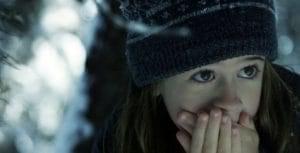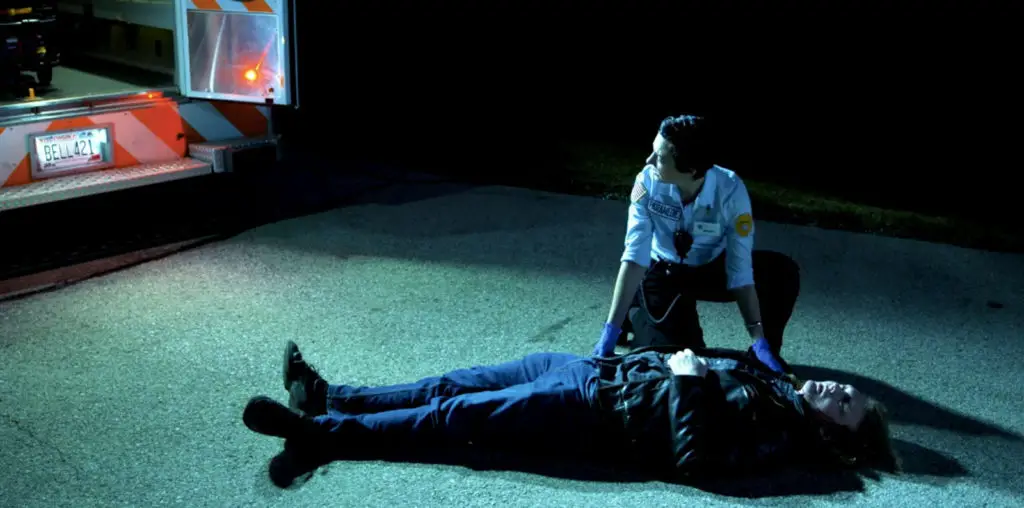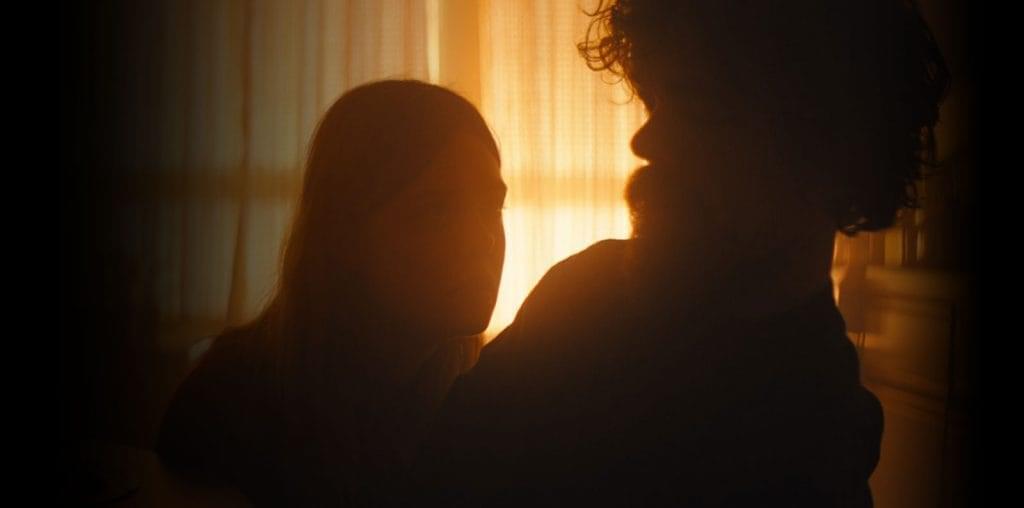
Cailean (Maritza Brikisak), the character at the center of the metaphysical indie drama The Lurking Man, is a woman trapped between two worlds. On earth, she clings to life in the aftermath of a terrible accident, while in some otherworldly purgatorial realm, she faces judgment and scorn from a temperamental angel of death (Daniel Lench).
The film itself is a lot like her – it often feels as if it’s caught between worlds, too. From scene to scene and, often, moment to moment, The Lurking Man can be powerful and affecting, a raw and serious attempt to grapple with heavy spiritual and psychological themes. But, at the same time, it can also come off as hokey and amateurish-feeling, undercutting its thoughtful and emotional moments with off choices in storytelling, staging, and performance that threaten to pull viewers right out of their engagement with it. Sometimes compelling, sometimes frustrating, and often, a mystifying mix of both, the film is, at least, never dull – it’s just hard, even after one has seen the entire thing, to pin down.
One thing that’s certain is that The Lurking Man isn’t afraid to go to some pretty dark places in unraveling its main character’s troubled, often tragic past. Cailean, whose life is shown in flashback as her soul lingers in limbo, is an alcoholic with deep-rooted anger issues, devastating childhood trauma, and major guilt surrounding the collapse of her marriage and the condition of her wheelchair-bound son (Jentzen Ramirez). Her faults and failings are displayed to her with little mercy by the fallen angel Sariel, a cloaked, pale-faced figure – the “lurking man” of the film’s title – whose ultimate plan for Cailean is a rather unexpected one that the film intriguingly withholds until its final act.

“…Sariel cycles her back through failed attempts to get and stay sober…”
Mostly, The Lurking Man plays out as a somber type of “This Is Your Life” scenario for Cailean, as Sariel cycles her back through failed attempts to get and stay sober, her on-again/off-again relationship with the kindly but enabling Emerson (Dorian Gregory), and her efforts to convince her estranged husband (Frank Krueger) to let her back into her son’s life.
This obviously entails a lot of big, swing-for-the-fences dramatic moments, but the film usually works best in the subtler, more elliptical mode that it sometimes manages to find in between them. A good example of this is a sequence set at an Alcoholics Anonymous-style meeting that Cailean attends; there’s a nicely done bit of editing in which the various participants’ stories of hitting rock bottom and seeking help slowly begin to fade into one another, but it’s immediately followed by a jarringly over-the-top scene that finds Cailean histrionically lashing out at the meeting leader (whose reaction to her is equally unconvincing).
That’s not to suggest that all of The Lurking Man‘s more significant narrative beats similarly fall flat, but rather just that the acting and writing (the script is credited to Brikisak, based on a novel by Keith Rommel) don’t always have a good sense of when less might be more, dramatically. This sometimes results in scenes that have a soap-operatic or student film-ish feel, which doesn’t suit material that calls out for a more delicate, assured touch. The same is true of the film’s cinematography and editing, which can both be effective but also could occasionally use some polish; a lackluster framing or an out-of-place music cue, once in a while, will hold back an otherwise nicely realized moment.

“Sometimes compelling, sometimes frustrating, and often, a mystifying mix of both…”
One choice that stands out as particularly strong is the casting of Lench in the title role, his booming voice and angular features going a long way toward making Sariel the imposing, mythical figure that the character absolutely needs to be. The minimalist, low-fi visual aesthetic of the purgatory sequences he appears in works well, also; it’s a good look achieved on what was likely a limited budget, a smart sidestep of the more elaborate (and, usually, rather silly-looking) green-screened nether-realms that sometimes show up in thematically similar efforts.
So, with all of that good and bad to consider, what’s the final verdict on this movie about an imperfect soul and whether it’s worth saving? The ultimate judgment, it’s fair to say, should be a positive one. The Lurking Man was clearly a labor of love for Brikisak, who wore a number of different behind-the-scenes hats in addition to starring, and one definitely can’t accuse her of not giving the production her all. Her film has conviction, it has heart, and it has some bold ideas, and while its reach does somewhat exceed its grasp, that reach is impressive in and of itself.

The Lurking Man (2017) Written by Maritza Brikisak. Based on the novel by Keith Rommel. Starring Maritza Brikisak, Daniel Lench, Frank Krueger, Dorian Gregory, Jentzen Ramirez, Chuck Saale, Joel Bryant, Carmen Perez, Tessa Espinola
6 out of 10



You hit it on the head with your review. I watch many, many independent films. This film was uneven; at one point early on I almost turned it off…I’m glad I didn’t. The acting was good for the most part… especially the Orthon character…she LOOKED like a chilling demon…and I’m sure that it had nothing to do with makeup and everything to do with the actress’ skills. This film deserved a big budget undertaking; but the cast, especially the talented Maritza Brikisak, made the best of what they had.
THANK YOU for your kind words, your review is very much appreciated.
Much thanks for the kind words